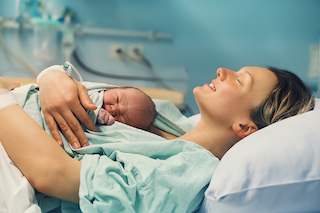 A new study published in the European Journal of Social Psychology looked at how the mindset of birth predicts birth outcomes.
A new study published in the European Journal of Social Psychology looked at how the mindset of birth predicts birth outcomes.
“Broadly speaking, the study is about the role of psychology in childbirth,” study author Lisa Hoffman told us. “We were interested whether psychological factors may have an effect on birth outcomes and whether, in turn, psychological factors (e.g., postpartum well-being, postpartum depression) may be predicted by birth.”
In social cognition research, it is a basic assumption that mental representations, that is, mindsets, guide people’s perception and influences behavior. Due to motivated reasoning, individuals might perceive information during labor and birth according to their mindset orientation. Via self-fulfilling prophecy (e.g., the expectation of not being able to handle the birth), this could have an effect on labor and birth.
“We wanted to know whether these basic assumptions of social cognition can also be applied to the context of birth, in which we tested whether the birth-related mindset measured during pregnancy has an effect on birth outcomes,” Hoffman told us. “There has been very little psychological research on childbirth. However, the topic is very relevant for a large number of people. Actually, you can say that it affects all people in one way or another.”
As the study shows, a negative birth experience may have a negative effect on the whole family. It is therefore important that psychologists devote more attention to this important issue.
The research team conducted a longitudinal study with approximately 300 participants. From the first trimester of pregnancy until six months after birth, they asked different questions about personality, mindset, birth, and bonding.
The researchers identified three factors that predicted whether medical interventions were needed at birth: The medical risk, giving birth for the first time and a more medical mindset. If interventions were needed, this led to a more negative birth experience, which in turn had a negative effect on well-being in the postpartum period. The latter was associated with a higher likelihood of developing psychopathological symptoms (postpartum depression and post-traumatic stress) and insecure bonding with the infant (six months after birth).
“The results confirmed the hypotheses we had formulated prior to conducting the study,” Hoffman told us. "The results indicate the importance of the birth experience and that it is necessary to consider psychological factors next to medical factors. The results also show that birth does not end in the delivery room and that everything should be done to enable childbearing persons to have a positive birth experience. There should also be an increased possibility to process the birth experience appropriately afterwards.”
It is important to highlight that individuals cannot choose their mindset, Hoffman explained. There is no research yet on whether it can be changed. Rather, it should be ensured that a positive birth experience can be achieved regardless of the mindset orientation. It should be recognized that childbearing women have different needs regarding childbirth.
Patricia Tomasi is a mom, maternal mental health advocate, journalist, and speaker. She writes regularly for the Huffington Post Canada, focusing primarily on maternal mental health after suffering from severe postpartum anxiety twice. You can find her Huffington Post biography here. Patricia is also a Patient Expert Advisor for the North American-based, Maternal Mental Health Research Collective and is the founder of the online peer support group - Facebook Postpartum Depression & Anxiety Support Group - with over 1500 members worldwide. Blog: www.patriciatomasiblog.wordpress.com
Email: tomasi.patricia@gmail.com